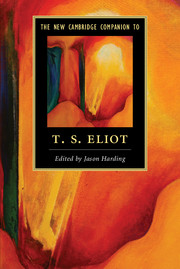Book contents
- Frontmatter
- Contents
- Notes on contributors
- Preface
- Chronology of Eliot's life and works
- List of abbreviations
- 1 Unravelling Eliot
- 2 Eliot: Form and Allusion
- 3 Prufrock and Other Observations
- 4 Banishing the Backward Devils: Eliot's Quatrain Poems and “Gerontion”
- 5 With Automatic Hand: The Waste Land
- 6 “Let These Words Answer”: Ash-Wednesday and the Ariel Poems
- 7 Four Quartets
- 8 “A Precise Way of Thinking and Feeling”: Eliot and Verse Drama 116
- 9 T. S. Eliot as Literary Critic
- 10 T. S. Eliot's Social Criticism
- 11 Gender and Sexuality
- 12 Eliot's Philosophical Studies: Bergson, Frazer, Bradley
- 13 “Anglo-Catholic in Religion”: T. S. Eliot and Christianity
- Select bibliography
- Index
- Miscellaneous Endmatter
13 - “Anglo-Catholic in Religion”: T. S. Eliot and Christianity
Published online by Cambridge University Press: 01 December 2016
- Frontmatter
- Contents
- Notes on contributors
- Preface
- Chronology of Eliot's life and works
- List of abbreviations
- 1 Unravelling Eliot
- 2 Eliot: Form and Allusion
- 3 Prufrock and Other Observations
- 4 Banishing the Backward Devils: Eliot's Quatrain Poems and “Gerontion”
- 5 With Automatic Hand: The Waste Land
- 6 “Let These Words Answer”: Ash-Wednesday and the Ariel Poems
- 7 Four Quartets
- 8 “A Precise Way of Thinking and Feeling”: Eliot and Verse Drama 116
- 9 T. S. Eliot as Literary Critic
- 10 T. S. Eliot's Social Criticism
- 11 Gender and Sexuality
- 12 Eliot's Philosophical Studies: Bergson, Frazer, Bradley
- 13 “Anglo-Catholic in Religion”: T. S. Eliot and Christianity
- Select bibliography
- Index
- Miscellaneous Endmatter
Summary
Of the significant influences on T. S. Eliot's life and work, religion is the most often misunderstood and misrepresented. The essential reason for this is the failure to take the poet at his word in several important statements that he made about his Christianity, at different points in his life. We also need to give careful attention to the ways in which he wrote about the experience of faith in his poems, and in his correspondence, too, now that several volumes of his letters have been published.
Eliot announced, in 1928, that the position that he had adopted (with regard to religion) was that of an “anglo-catholic” (CP3 513). It is necessary to be clear about what that statement means and what it does not mean. Characteristically, Eliot presents us with a precise formula. And his declaration, especially in that twentieth-century inter-war period of burgeoning conviction and confidence in the Anglo-Catholic movement in the Church of England, amounted to an unequivocal public expression of allegiance to an increasingly conspicuous variety of faith and practice. Eliot was to remain faithful to this for the rest of his life. He was not merely a “High Church” Anglican; he had not, by embracing Anglo-Catholicism, joined the “establishment” (quite the contrary, in fact), and he had not become, as some confused commentators seem to believe, a “Catholic,” apparently meaning to designate, by that term, a Roman Catholic. “Mon point de vue est Anglo-Catholique et pas Catholique de Rome,” [“My point of view is Anglo-Catholic and not Roman Catholic”] Eliot wrote to Jacques Maritain in 1927 (L3 620). Others refer to “the Anglo-Catholic Church” and Eliot joining it. There was and is no such body. Eliot pointed out emphatically in some notes on Northrop Frye's book about him: “One does not join an Anglo-Catholic wing!” (L3 573n1). And, usually, people speak of Eliot's “conversion” to Christianity. Not only did Eliot not undergo a conversion experience, but he firmly deprecated the idea, both with regard to his own religious experience and to any influence that his faith or his references to it in his work might have on others.
- Type
- Chapter
- Information
- The New Cambridge Companion to T. S. Eliot , pp. 187 - 202Publisher: Cambridge University PressPrint publication year: 2016
- 1
- Cited by

